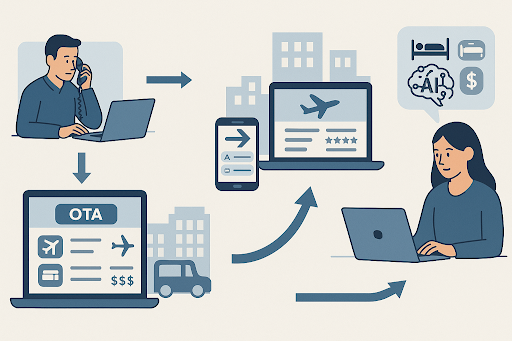
Travel
Unlock the Power of Travel Meta Search Engines for Smarter Bookings
Introduction: The Evolution of Travel Search

The landscape of travel planning has experienced a profound transformation over the past two decades. Initially, travelers relied on isolated booking platforms—sometimes even calling hotels or airlines directly—to make reservations. This approach often meant manually comparing prices across multiple sites and investing significant time and effort just to find the best possible itinerary. With the rapid growth of online travel agencies (OTAs), such as Expedia and Booking.com, the process evolved. However, travelers were still limited to comparing available options within each individual OTA’s inventory.
The next major leap forward came with the development of meta search engines. These advanced platforms aggregate and compare pricing and availability from a diverse array of sources, including OTAs, independent hotels, airline websites, and more. By collecting and displaying this vast range of offerings in one place, meta search engines, such as Kayak, Skyscanner, and Google Flights, empower users to make informed decisions without the hassle of checking multiple websites.
Artificial intelligence plays an essential role in enhancing these platforms. Modern AI tools analyze user preferences, anticipate demand, personalize recommendations, and streamline the search experience, creating a genuinely user-centric ecosystem.
Key Developments in Travel Search
- Early travel bookings were often manual and required contacting providers directly.
- Online travel agencies brought digital convenience but still functioned as isolated platforms.
- Meta search engines emerged, delivering comprehensive, real-time comparison by aggregating offerings from OTAs, hotels, airlines, and more.
- Users benefit from transparent comparisons of prices, amenities, and reviews—empowering smarter choices.
- Advanced AI technologies further refine results, personalize recommendations, and identify the best deals in real time—all from a single platform.
- Today’s travel meta search engines save valuable time, increase transparency, and place travelers in control of their journey planning.
This continuous evolution reflects the industry’s commitment to making travel planning seamless, efficient, and highly personalized for every user.
Why Meta Search is Reshaping the Travel Industry

Meta search engines have emerged as a pivotal force in the travel industry, transforming the way both consumers and companies interact with travel booking. Platforms that aggregate, compare, and display prices from multiple travel suppliers have rapidly gained popularity. This surge is driven by consumers’ increasing demand for efficiency, transparency, and access to global choices when planning trips.
One of the key reasons behind the rapid adoption of meta search in travel is the convenience it offers. Instead of navigating dozens of travel websites, consumers can compare flights, hotels, and rental cars on a single platform. This comprehensive approach saves significant time and ensures travelers are presented with the most competitive rates available. Meta search engines optimize the user experience by delivering tailored results based on preferences and previous search behavior, making the overall booking process more seamless and intuitive.
Furthermore, modern travelers are more value-conscious and informed than ever before. They actively seek platforms that provide transparent information about pricing, availability, and additional features such as cancellation policies or hidden fees. Meta search engines directly cater to this demand by displaying a wide range of options, fostering an environment of openness and trust. As a result, travelers feel empowered to make choices that are not just cost-effective, but also tailored to their specific needs and expectations.
Key Reasons Why Meta Search is Leading Change
- Convenience: Offers a single access point for multiple travel providers, minimizing time spent searching.
- Comprehensive Price Comparison: Aggregates prices across platforms, ensuring travelers get the best deals without switching between sites.
- Transparency: Promotes honest price comparisons and reveals added fees, giving travelers peace of mind.
- Empowerment: Enables consumers to make informed choices with real-time data from multiple sources.
- Global Accessibility: Connects users to hotels, flights, and rentals worldwide, expanding choice beyond traditional local providers.
- Customization: Uses AI and data analytics to suggest results based on prior searches and preferences.
- Competitive Pressure: Encourages suppliers to keep prices competitive, benefiting end consumers.
These factors combined are fundamentally reshaping the structure, culture, and expectations within the travel marketplace, establishing meta search as an indispensable tool for modern travelers and industry stakeholders alike.
Key Challenges Faced Without Meta Search Integration

In today's highly competitive digital travel marketplace, the absence of meta search integration can significantly impede a travel provider’s growth and success. Meta search engines play a vital role in connecting travelers with a variety of accommodation, flight, and activity options from multiple providers, all in one place. When travel companies do not leverage this integration, they face several tangible business challenges that affect both their reach and their bottom line.
Limited Reach and Discoverability
Without meta search integration, travel providers are less visible to a broader audience actively seeking travel solutions. Travelers increasingly start their booking journey on meta search platforms, comparing prices and availability across different sources. If a travel provider is not present here, they miss out on valuable exposure, diminishing their chances of being chosen by potential customers who are ready to make a booking.
Difficulty in Customer Acquisition and Retention
Meta search platforms offer access to high-intent, ready-to-book traffic. Without this channel, travel providers must rely on more traditional, and often less effective, marketing avenues. This makes it harder to attract new customers, especially as competitors tap into the same market with enhanced visibility. Furthermore, retaining customers becomes challenging, as the convenience and comparability offered by meta search sites set higher expectations for seamless booking experiences.
Inefficiencies in Marketing Spend
A lack of meta search integration can lead to inefficient allocation of marketing resources. Traditional digital marketing efforts—such as pay-per-click campaigns or display advertising—often cast a wide net, reaching users who may not be actively planning or booking travel. In contrast, meta search drives intent-driven traffic, ensuring that marketing budgets yield better, measurable returns by engaging potential customers at the point of decision-making.
In summary, the key challenges include:
- Reduced visibility to high-intent travelers.
- Increased difficulty in standing out amid competition.
- Higher customer acquisition costs and lower conversion potential.
- Less efficient use of marketing budgets without targeted, intent-based traffic.
- Diminished customer retention due to lack of convenience and price transparency.
Addressing these challenges requires a strategic focus on integrating meta search, enabling travel providers to maximize their reach, efficiency, and customer satisfaction in a competitive digital landscape.
The Benefits of Leveraging Meta Search Platforms

Meta search platforms have fundamentally changed how travel businesses connect with their audience in an increasingly digital world. By integrating these platforms into your marketing and distribution strategies, companies can access a broader, more targeted pool of travelers while gaining valuable insights that drive long-term success.
Meta search engines aggregate listings from multiple sources, offering travelers a seamless and comprehensive comparison experience. This approach not only increases the likelihood of engaging high-intent users—people actively searching for the best travel options—but also provides a level playing field where price, quality, and unique selling points are transparently displayed.
Key Benefits
Access to Millions of High-Intent Travelers
- Meta search platforms reach a global customer base, connecting your brand directly with travelers who are already in the purchase consideration phase. This facilitates efficient targeting and higher chances of converting lookers into bookers.
- Improved Conversion Rates
- By showcasing prices and options alongside competitors, consumers are empowered to confidently select the best deal, reducing hesitation and increasing the probability of booking directly. The transparency and trust fostered by unbiased listings can significantly boost conversion rates.
- Brand Visibility Across the Decision Journey
- Your brand is presented at every key touchpoint in the traveler’s search and booking journey. Maintaining a presence from initial research to final booking decision helps foster top-of-mind awareness and brand preference, even if travelers return multiple times before deciding.
- Enhanced Data Collection and Insights
- Integrating with meta search platforms enables access to rich data on traveler preferences, booking behaviors, and market trends. These insights allow for more refined marketing strategies, personalized pricing, and tailored customer experiences.
In summary, leveraging meta search platforms strengthens brand presence, drives measurable growth in bookings, and delivers a strategic advantage powered by actionable data and a global reach.
Critical Features of Modern Travel Meta Search

Modern travel meta search platforms serve as powerful gateways for travelers seeking the best options quickly and efficiently. They have evolved to deliver not only breadth of choice but also smart, real-time decision-making driven by cutting-edge technology.
Key Characteristics
- Real-Time Inventory & Dynamic Pricing:
Leading meta search engines source inventory directly from airlines, hotels, and third-party aggregators, ensuring that travelers see the latest availability and live prices. Instant updates prevent issues with overbooking or price changes, building user trust and confidence. - Seamless Mobile and Desktop Experiences:
Travelers expect frictionless access across devices. Top platforms invest in responsive web design and dedicated apps, maintaining consistent interfaces whether bookings occur on a smartphone or desktop. Features such as saved searches and synchronized accounts further enhance cross-platform usability. - Deep Filtering and Personalization:
Advanced filtering allows users to refine results based on criteria like price, flexibility, amenities, layover times, and ratings. Machine learning-driven personalization adapts recommendations to individual preferences, search history, and even geo-location, resulting in a tailored browsing experience. - Transparent, User-Friendly Interface:
Simplicity and clarity are paramount. Effective meta searches display total prices up front, highlight key differences between options, and avoid hidden fees. Intuitive comparison tools, such as side-by-side table layouts and visual cues, help travelers confidently evaluate offers and make informed choices. - Integration with Direct Booking and “Book on Meta”:
The integration of seamless direct reservations within the meta environment is an emerging standard. By allowing travelers to complete bookings without leaving the platform, “Book on Meta” features reduce friction and abandonment rates, all while maintaining data security and transactional transparency.
These features collectively transform the travel planning journey, making it smarter, quicker, and more trustworthy for users worldwide.
Under the Hood: Technology & Investment Requirements
Delivering seamless, data-driven experiences in today’s digital marketplace requires a sophisticated combination of technologies and strategic investment. To achieve operational excellence and user satisfaction, companies must focus on several critical areas:
API Connectivity for Live Inventory Management
Modern inventory systems rely on robust API connectivity to provide real-time updates on product availability. This ensures customers have access to accurate stock levels, prevents overselling, and facilitates immediate inventory adjustments as transactions occur. Strong API integration supports efficient collaboration between suppliers, distributors, and end-users.
- Real-time data synchronization across multiple channels.
- Quick response to inventory fluctuations and market demand.
- Reduction in manual errors and increased operational efficiency.
Machine Learning for Personalized Recommendations and Sorting
Implementing machine learning enables businesses to analyze user behavior, preferences, and purchase history. Utilizing advanced algorithms, organizations can deliver tailored product recommendations and dynamic sorting, which both elevates user experience and drives higher conversion rates.
- Customized product listings for individual users.
- Improved relevancy through ongoing learning from user interactions.
- Enhanced search functionality and filtering based on personalized insights.
Infrastructure for Real-Time, Large-Scale Data Aggregation
Handling vast streams of real-time data requires scalable and secure infrastructure. Cloud platforms, big data tools, and distributed databases play a vital role in supporting continuous data collection, processing, and analytics.
- Scalable cloud services for seamless growth.
- High-availability architectures to ensure platform reliability.
- Secure data pipelines to maintain privacy and integrity.
Understanding CPC and CPA Models in Meta Search
Cost Per Click (CPC) and Cost Per Acquisition (CPA) are key advertising metrics used by meta search partners. CPC focuses on the cost incurred each time a user clicks an ad, while CPA measures the cost associated with acquiring a new customer. Both models require careful budgeting and monitoring to maximize marketing ROI.
- CPC: Emphasizes driving traffic at a controllable cost.
- CPA: Prioritizes conversion efficiency over sheer volume.
- Data-driven decision-making to optimize ad spend across channels.
By thoughtfully investing in these technologies and strategic frameworks, organizations position themselves for sustainable growth and increased customer satisfaction.
How Travel Brands Can Harness Meta Search Effectively
Travel brands can drive significant growth by strategically leveraging meta search engines. These platforms aggregate offerings from various online travel sites, giving brands broad visibility among high-intent consumers. To excel, brands must take a deliberate approach to listing inventory, optimizing digital presence, managing bids, and harnessing analytics for continual improvement.
Steps to List Inventory and Optimize Presence
- Register and integrate with leading meta search engines such as Google Hotel Ads, TripAdvisor, and Trivago.
- Ensure seamless connectivity between your booking engine and the meta search platform to enable live pricing and availability updates.
- Use high-quality, consistent content—including accurate descriptions, amenities, and best-in-class images—to showcase your properties or offerings.
- Maintain up-to-date inventory and pricing to avoid discrepancies that erode customer trust.
Best Practices for Bid Management, Content Quality, and Review Aggregation
- Adopt a dynamic bid management strategy, adjusting spend based on occupancy rates, seasonality, and campaign goals.
- Continuously refine ad copy and headlines to improve click-through rates and ensure alignment with actual guest experiences.
- Monitor and respond to reviews promptly. Proactively encourage satisfied guests to share their experiences, increasing your property’s rating and relevance.
- Consolidate guest feedback from all connected channels to gain a holistic view of your reputation.
Leveraging Analytics to Maximize ROI
- Implement robust tracking on campaign performance across all meta search partners.
- Analyze cost per acquisition (CPA), click-through rate (CTR), and conversion data to identify high-performing segments.
- Use these insights to refine campaigns—allocating budget to the best channels, optimizing offers, and enhancing marketing messages.
- Regularly review the analytics to identify new trends and emerging demand patterns for future campaign planning.
By combining precise inventory management, strategic bidding, outstanding content, and a data-driven approach, travel brands can maximize their impact and returns from meta search engines, ensuring continued competitiveness in the dynamic travel industry.
Case Studies: Brands Achieving Massive Growth with Meta Search
Meta search has revolutionized how OTAs, hotel groups, and airlines reach potential guests and scale their bookings. By consolidating inventory across multiple platforms, brands can achieve unprecedented reach, transforming their digital marketing performance and bottom-line results. Here are real-world success stories showcasing dramatic, quantifiable growth achieved by embracing meta search.
In recent years, several leading travel brands have leveraged meta search engines such as Google Hotel Ads, TripAdvisor, and Kayak to capture demand at critical moments of intent.
For example, a prominent European hotel chain experienced a 30% increase in direct bookings within six months of launching campaigns across major meta search platforms. Similarly, an OTA expanded its reach globally, growing bookings by 45% and boosting online revenue by 60% in just one year.
Airlines that strategically integrated with meta search partners reported up to a 25% uplift in booking conversion rates, outpacing growth from other digital channels. These outcomes illustrate not only the massive reach possible with meta platforms but also their power to deliver measurable business results, from higher occupancy rates to stronger brand visibility.
Key Success Stories and Quantifiable Results
- A leading hotel group saw a 30% jump in direct bookings and 25% revenue growth after optimizing their presence on meta search platforms. Increased exposure led to stronger brand loyalty and a measurable reduction in dependency on traditional OTAs.
- A major OTA reported a 45% rise in global bookings after integrating with new meta search partners, with a 60% increase in total online revenue, primarily from new international markets.
- An established airline partnered with top meta search engines, resulting in a 22% increase in booking conversion rates—translating to millions in incremental revenue annually.
- Brands noted improved marketing efficiency, with industry studies revealing meta search could deliver a 10–30% lower cost per acquisition compared to legacy digital campaigns.
The Future of Travel Meta Search: What’s Next?
The travel meta search landscape is rapidly evolving, driven by emerging technologies and changing consumer expectations. One of the most significant trends shaping this evolution is the integration of AI-powered personalization. Advanced artificial intelligence tools analyze user preferences, past behaviors, and real-time context to deliver highly tailored travel options. This personalization helps travelers find the best deals, accommodations, and experiences suited uniquely to their needs, enhancing convenience and satisfaction.
Another pivotal development transforming travel meta search is the growing use of voice search. With the proliferation of smart devices and virtual assistants, users increasingly interact with travel platforms through voice commands. This modality requires travel meta search engines to optimize search algorithms for natural language processing, making it easier and faster for travelers to plan trips hands-free.
Instant booking capabilities are also becoming a key feature. Meta search platforms are moving beyond simply aggregating information to enabling seamless and immediate reservations. This integration accelerates the booking journey and reduces friction, meeting the demand for quick and hassle-free travel planning.
The role of meta search in the travel industry is expanding as major players like Google and TripAdvisor enhance their offerings, alongside numerous niche platforms focused on specific markets or traveler preferences. These platforms leverage AI and data analytics to refine search accuracy and improve user experience, making meta search an indispensable tool for travelers and providers alike.
Key Trends in Travel Meta Search Evolution
- AI-powered personalization tailor travel options to individual preferences and behaviors
- Voice search enhances convenience through natural language interactions
- Instant booking capabilities streamline the reservation process
- Major platforms like Google and TripAdvisor expand their services with niche competitors enriching the market
- Enhanced data analytics increase search accuracy and targeted recommendations
For further discussion on how these trends are shaping the travel meta search industry, please feel free to schedule a meeting via this Meeting Link.
Conclusion
As the travel industry rapidly shifts with evolving consumer expectations and digital innovation, the role of meta search platforms has never been more crucial. Meta search engines give travel brands an unparalleled opportunity to showcase their offerings to a broader, more targeted audience—placing your business directly where travelers begin their booking journey. By streamlining comparison, fostering transparent competition, and supporting real-time inventory management, meta search platforms drive both reach and conversions for modern travel companies.
Why Meta Search Integration Is Essential
Travelers today are empowered: they seek transparency, value, and convenience in every transaction. Meta search sites respond to these needs by aggregating prices and options from multiple sources, enabling users to easily compare offerings and make informed choices. For travel brands, this means higher visibility, engagement, and ultimately, a measurable boost in direct bookings and revenue.
Key Benefits of Integrating with Meta Search:
- Reach new customer segments at the decisive moment of research and booking.
- Enhance transparency and credibility by providing real-time, competitive pricing.
- Reduce dependence on traditional distribution channels and decrease acquisition costs.
- Access valuable market analytics to optimize pricing and inventory strategies.
- Future-proof your business with agile, scalable digital integration.
The competitive edge lies in acting now. Delaying meta search adoption means missing out on vital opportunities and falling behind more agile competitors.
Expand your reach, boost conversions, and build resilience for tomorrow’s market. To learn how seamless meta search integration can transform your travel business, connect with dedicated experts who understand both technology and traveler behavior.
Contact us today to start your journey toward smarter distribution and sustainable growth: Contact - OneClick Travel Tech

Your Tech Partner for Scalable Travel Growth
We’re here to help you shape your business, so reach out to us today.